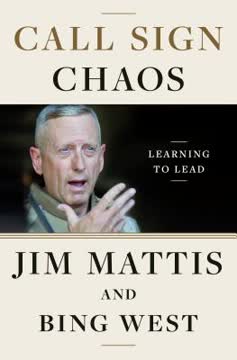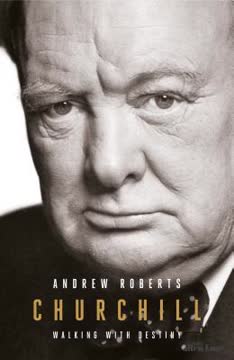نکات کلیدی
1. رهبران بزرگ تاریخ را با ویژگیها و شرایط منحصر به فرد خود شکل میدهند
"برای یک چک کافی است که سبیل بگذارد تا هر کسی از نحوهی آویزان شدن آن بفهمد که او از نژاد مغولی است." هیتلر در ژانویه 1942 بیان کرد.
شخصیتهای منحصر به فرد. رهبرانی که در این کتاب بررسی شدهاند، از ناپلئون تا مارگارت تاچر، هر یک ویژگیهای خاصی داشتند که آنها را متمایز میکرد. پیشینهها، تجربیات و ویژگیهای شخصی آنها سبکهای رهبری و فرآیندهای تصمیمگیریشان را شکل داد.
محصولات زمان خود. این رهبران همچنین تحت تأثیر زمینههای تاریخی که در آن زندگی میکردند، قرار داشتند. ظهور ناپلئون با انقلاب فرانسه تسهیل شد، در حالی که اراده چرچیل در کورهی جنگ جهانی دوم شکل گرفت. اقدامات آنها هم تحت تأثیر تاریخ قرار داشت و هم به شکلگیری آن کمک کرد.
تأثیر ماندگار. تصمیمات و اقدامات این رهبران پیامدهای دوربردی داشت که فراتر از عمر آنها ادامه یافت. اصلاحات قانونی ناپلئون، مقاومت چرچیل در برابر آلمان نازی و سیاستهای اقتصادی تاچر همچنان بر جوامع مدرن و تفکر سیاسی تأثیر میگذارد.
2. کاریزما و خودباوری ضروری است اما میتواند ساخته شود
"شما فکر میکنید من به پیروزی انگلستان در جنگ علاقهمندم." او به افسر ارتباطی بریتانیاییاش، ژنرال سر لوئیس اسپیرز گفت. "من نیستم. من فقط به پیروزی فرانسه علاقهمندم."
کاریزمای پرورده شده. بسیاری از رهبران، مانند هیتلر و ناپلئون، به طور عمدی تصویری از کاریزما را برای الهامبخشی به پیروان و تحکیم قدرت خود پرورش دادند. این شامل برنامهریزی دقیق برای حضورهای عمومی، کنترل روایتهای رسانهای و ایجاد اسطورههای شخصی بود.
خودباوری پایدار. تمام رهبران بررسی شده، سطح فوقالعادهای از خودباوری را نشان دادند که اغلب به مرز خودبزرگبینی نزدیک بود. این خودباوری در الهامبخشی به دیگران و پایداری در زمانهای دشوار بسیار حیاتی بود.
خطرات تصویر ساخته شده. در حالی که کاریزما و خودباوری میتوانند ابزارهای قدرتمندی باشند، اما همچنین میتوانند به جدایی از واقعیت و تصمیمگیریهای ضعیف منجر شوند. تصویر ساخته شدهی هیتلر از عدم اشتباه در نهایت به سقوط آلمان کمک کرد.
3. ایدئولوژی و تجربیات شخصی به شدت بر سبک رهبری تأثیر میگذارند
"فرانسه نمیتواند فرانسه باشد بدون عظمت." ژنرال دوگل در پاراگراف ابتدایی یادداشتهای جنگیاش نوشت.
پایههای ایدئولوژیک. اقدامات رهبران غالباً تحت تأثیر باورهای ایدئولوژیک عمیق قرار داشت. پایبندی استالین به مارکسیسم-لنینیسم، نظریههای نژادی هیتلر و اصول بازار آزاد تاچر همگی به طور قابل توجهی بر رویکردهای رهبری آنها تأثیر گذاشت.
تجربیات شکلدهنده. تجربیات اولیه زندگی نقش مهمی در شکلدهی به دیدگاههای جهانی این رهبران داشت. خشم دوگل از حادثه فاشودا، تربیت ویکتوریایی چرچیل و تجربیات استالین در زیرزمین روسیه همگی بر اقدامات بعدی آنها به عنوان رهبر تأثیر گذاشت.
ثبات و تحول. در حالی که برخی از رهبران در مواضع ایدئولوژیک خود نسبتاً ثابت ماندند، دیگران در طول زمان تحول یافتند. درک این پایههای ایدئولوژیک و چگونگی تغییر آنها کلید فهم فرآیندهای تصمیمگیری این رهبران است.
4. رهبران مؤثر بین چشمانداز استراتژیک و سازگاری تعادل برقرار میکنند
"من از زنانی که در سیاست دخالت میکنند متنفرم. و اگر دخالت آنها به مسائل نظامی کشیده شود، کاملاً غیرقابل تحمل میشود. در هیچ بخشی از حزب، هیچ زنی هرگز حق نداشته که حتی کوچکترین پستی را داشته باشد."
چشمانداز بلندمدت. رهبران موفقی مانند چرچیل و دوگل یک چشمانداز بلندمدت واضح برای ملتهای خود حفظ کردند، حتی در مواجهه با چالشهای فوری. این به آنها اجازه میداد تا تصمیماتی با در نظر گرفتن زمینه تاریخی وسیعتر اتخاذ کنند.
انعطافپذیری تاکتیکی. با وجود داشتن استراتژیهای کلی، رهبران مؤثر مانند آیزنهاور توانایی سازگاری با شرایط در حال تغییر را نشان دادند. این انعطافپذیری در پیمودن پیچیدگیهای جنگ و سیاست بینالملل بسیار حیاتی بود.
یادگیری از اشتباهات. ظرفیت یادگیری از شکستها و تنظیم استراتژیها بهطور مناسب، نشانهای از رهبری موفق بود. توانایی ناپلئون در یادگیری از شکستهای اولیه به پیروزیهای بعدیاش کمک کرد.
5. ارتباط و الهامبخشی مهارتهای کلیدی رهبری هستند
"وقتی فرانسویها برای بشریت میجنگند، شگفتانگیز هستند." آندره مالرو نوشت؛ "وقتی برای خودشان میجنگند، هیچ چیز نیستند."
بلاغت قوی. رهبرانی مانند چرچیل و دوگل از مهارتهای بلاغتی خود برای الهامبخشی به ملتهایشان در زمانهای بحران استفاده کردند. سخنرانیهای آنها به نقاط تجمعی برای مقاومت و پایداری تبدیل شد.
اقدامات نمادین. رهبران مؤثر قدرت حرکات نمادین را درک کردند. بازگشت دوگل به پاریس و واکنش تاچر به حمله فالکلند به دقت برنامهریزی شده بود تا تأثیر الهامبخش آنها را به حداکثر برساند.
ارتباط مستقیم. بسیاری از رهبران، از جمله ناپلئون و چرچیل، سعی کردند بهطور مستقیم با پیروان خود ارتباط برقرار کنند و در صورت لزوم از کانالهای سنتی عبور کنند. این ارتباط مستقیم به ایجاد وفاداری و حفظ روحیه کمک کرد.
6. بیرحمی و قاطعیت در رهبری زمان جنگ اغلب ضروری است
"شکست ارتشهای آلمانی کامل است." بیش از هشت ماه خونین قبل از اینکه واقعاً چنین باشد.
تصمیمات سخت. رهبران زمان جنگ اغلب با انتخابهای اخلاقی مبهم مواجه بودند. تصمیم چرچیل برای غرق کردن ناوگان فرانسه در مرسالکبیر و تاکتیکهای زمین سوخته استالین نشاندهنده تصمیمات دشواری است که در زمان جنگ لازم بود.
هزینه شخصی. بار این تصمیمات بر دوش بسیاری از رهبران سنگینی میکرد. نامههای شخصی تاچر به خانوادههای سربازان کشته شده، هزینه انسانی رهبری در زمان جنگ را نشان میدهد.
عمل متوازن. رهبران مؤثر باید بیرحمی را با حفظ اقتدار اخلاقی متوازن کنند. کسانی که در این کار شکست خوردند، مانند هیتلر، در نهایت موقعیت خود را تضعیف کردند.
7. رهبران بزرگ از تاریخ میآموزند اما درسها را بهطور متفاوتی تفسیر میکنند
"ای کاش استالین میدانست چه خبر است" فریادی بود که در هر جنایت بیرحمانه جدیدی از روسها شنیده میشد، اما استالین دقیقاً میدانست چه خبر است.
الهام تاریخی. بسیاری از رهبران از شخصیتها و رویدادهای تاریخی الهام میگرفتند. ناپلئون خود را به عنوان جانشین سزار میدید، در حالی که چرچیل به دوک مارلبرو نگاه میکرد.
تفسیر انتخابی. رهبران اغلب درسهای تاریخی را به گونهای تفسیر میکردند که با دیدگاههای جهانی خود سازگار باشد و اقدامات خود را توجیه کنند. تفسیر نادرست هیتلر از نظریههای "نژادی" تاریخی پیامدهای فاجعهباری داشت.
ایجاد میراث. این رهبران همچنین به جایگاه خود در تاریخ آگاه بودند و اغلب با نگاهی به چگونگی یادآوری آنها عمل میکردند. این آگاهی گاهی بر فرآیندهای تصمیمگیری آنها تأثیر میگذاشت.
8. شجاعت شخصی و رهبری با مثال الهامبخش پیروان است
"احساس شوخطبعی و ایمان بزرگ، یا در غیر این صورت عدم تخیل کامل، برای سلامت عقل ضروری است." او شوخی کرد.
شجاعت جسمی. بسیاری از رهبران، از جمله ناپلئون و نلسون، در میدان جنگ شجاعت شخصی را نشان دادند که وفاداری و تحسین را در میان نیروهای خود الهام بخشید.
شجاعت اخلاقی. رهبرانی مانند چرچیل و دوگل در ایستادگی در برابر موانع به ظاهر غیرقابل عبور شجاعت اخلاقی نشان دادند و نقطه تجمعی برای مقاومت فراهم کردند.
مشترک در سختی. رهبران مؤثر اغلب در سختیهای پیروان خود شریک بودند. تصمیم استالین برای ماندن در مسکو در حین پیشروی آلمان نمونهای از این اصل در عمل است.
9. رهبران موفق در چشماندازهای سیاسی و دیپلماتیک پیچیده حرکت میکنند
"من هیچ دفتری ندارم و بنابراین باید به شایعات دستدوم تکیه کنم و از این موضوع خوشم نمیآید."
ساخت ائتلاف. رهبرانی مانند آیزنهاور و چرچیل باید ائتلافهای پیچیدهای را مدیریت میکردند و منافع متضاد را برای حفظ وحدت هدف متوازن میکردند.
سیاست داخلی. حتی در زمان جنگ، رهبران باید در چشماندازهای سیاسی داخلی حرکت میکردند. مدیریت تاچر از کابینهاش در طول بحران فالکلند این مهارت را نشان میدهد.
دیپلماسی بینالمللی. رهبران موفق اهمیت درک برداشت بینالمللی را درک کردند. تأکید دوگل بر اعتبار فرانسه و دستکاری استالین در رهبران متفقین در کنفرانسها برای موفقیت آنها حیاتی بود.
آخرین بهروزرسانی::
FAQ
What's "Leadership in War: Essential Lessons from Those Who Made History" about?
- Overview of Leadership: The book explores the leadership qualities of nine historical figures who led during times of war, analyzing their strategies, decisions, and impacts.
- Historical Context: It provides a historical context for each leader, detailing the wars they were involved in and the challenges they faced.
- Leadership Lessons: The author, Andrew Roberts, distills essential leadership lessons from these figures, applicable to both wartime and peacetime scenarios.
- Moral Neutrality of Leadership: The book discusses how leadership is morally neutral, capable of leading to both great achievements and catastrophic failures.
Why should I read "Leadership in War: Essential Lessons from Those Who Made History"?
- Insightful Analysis: The book offers deep insights into the minds and strategies of some of history's most influential leaders.
- Applicable Lessons: It provides leadership lessons that are applicable beyond military contexts, useful for modern-day leaders in various fields.
- Historical Perspective: Readers gain a better understanding of historical events and the pivotal roles these leaders played in shaping them.
- Engaging Narratives: The book is well-researched and written in an engaging style, making complex historical events accessible and interesting.
What are the key takeaways of "Leadership in War: Essential Lessons from Those Who Made History"?
- Leadership is Complex: Leadership involves a combination of personal traits, strategic thinking, and the ability to inspire and motivate others.
- Moral Neutrality: Leadership itself is morally neutral; it can lead to both positive and negative outcomes depending on the leader's intentions and actions.
- Historical Lessons: Studying past leaders can provide valuable lessons for contemporary leadership challenges.
- Adaptability and Timing: Successful leaders often demonstrate adaptability and a keen sense of timing in their decision-making processes.
What are the best quotes from "Leadership in War: Essential Lessons from Those Who Made History" and what do they mean?
- "Leadership is a protean force of terrifying power." This quote highlights the immense influence leaders can wield, for better or worse.
- "The art of leadership explains how not merely one hundred people, but sometimes a hundred thousand, or a million... can ultimately be led." It underscores the complexity and scale of effective leadership.
- "Leadership is completely morally neutral." This emphasizes that leadership itself is not inherently good or bad; its moral value depends on how it is used.
- "In leaders, the challenge of war brings forth qualities we can readily measure." This suggests that war often reveals the true capabilities and character of leaders.
How does Andrew Roberts define leadership in "Leadership in War"?
- Art of Leadership: Roberts defines leadership as the art of guiding and inspiring large groups of people, often in challenging circumstances.
- Morally Neutral: He emphasizes that leadership is morally neutral, capable of leading to both positive and negative outcomes.
- Self-Belief: A common trait among the leaders discussed is a profound sense of self-belief, which is central to effective leadership.
- Task-Oriented: Leaders often have a clear task or mission they are driven to achieve, which guides their actions and decisions.
What leadership qualities does Andrew Roberts highlight in "Leadership in War"?
- Self-Belief: A strong sense of self-belief is crucial for effective leadership, as seen in leaders like Churchill and Napoleon.
- Adaptability: Successful leaders demonstrate adaptability, adjusting their strategies to meet changing circumstances.
- Inspiration: The ability to inspire and motivate others is a key trait of effective leaders, as exemplified by figures like Nelson and Eisenhower.
- Strategic Thinking: Leaders must possess strategic thinking skills to navigate complex situations and make informed decisions.
How does "Leadership in War" explore the moral neutrality of leadership?
- Neutral Force: The book argues that leadership is a neutral force, capable of leading to both great achievements and catastrophic failures.
- Examples of Leaders: It examines leaders like Hitler and Stalin, who used their leadership skills for destructive purposes, contrasting them with leaders who used their skills for positive outcomes.
- Moral Responsibility: The book suggests that the moral responsibility of leadership lies in the intentions and actions of the leader, not in the concept of leadership itself.
- Understanding Power: Understanding the power of leadership is crucial to directing it toward positive ends, as demonstrated by the leaders discussed.
What historical figures are analyzed in "Leadership in War" and why?
- Napoleon Bonaparte: Analyzed for his military genius and ability to inspire his troops, despite his ultimate downfall.
- Winston Churchill: Examined for his leadership during World War II and his ability to rally a nation during its darkest hours.
- Adolf Hitler: Studied for his charismatic leadership and the catastrophic consequences of his morally bankrupt vision.
- Margaret Thatcher: Included for her decisive leadership during the Falklands War and her impact on British politics.
How does Andrew Roberts use historical context in "Leadership in War"?
- Detailed Backgrounds: Roberts provides detailed historical backgrounds for each leader, setting the stage for their actions and decisions.
- War Contexts: The book explores the specific wars and conflicts each leader was involved in, highlighting the challenges they faced.
- Comparative Analysis: By comparing different leaders, Roberts draws out common themes and lessons applicable across different historical contexts.
- Impact on History: The book examines how these leaders' actions influenced the course of history and shaped the modern world.
What role does self-belief play in leadership according to "Leadership in War"?
- Central Trait: Self-belief is highlighted as a central trait of effective leaders, providing them with the confidence to make bold decisions.
- Examples: Leaders like Churchill and Napoleon are noted for their strong self-belief, which drove their actions and inspired others.
- Overcoming Setbacks: Self-belief helps leaders overcome setbacks and view failures as temporary obstacles rather than insurmountable barriers.
- Inspiration: A leader's self-belief can inspire confidence and trust in their followers, motivating them to achieve shared goals.
How does "Leadership in War" address the concept of adaptability in leadership?
- Essential Quality: Adaptability is presented as an essential quality for leaders, allowing them to adjust strategies in response to changing circumstances.
- Historical Examples: The book provides examples of leaders who successfully adapted to new challenges, such as Eisenhower during World War II.
- Flexibility: Adaptability requires flexibility in thinking and a willingness to change course when necessary to achieve objectives.
- Learning from Mistakes: Leaders who are adaptable learn from their mistakes and use those lessons to improve their future decision-making.
What lessons can modern leaders learn from "Leadership in War"?
- Moral Neutrality: Understanding that leadership is morally neutral can help modern leaders focus on using their influence for positive outcomes.
- Self-Belief and Confidence: Cultivating self-belief and confidence can empower leaders to make bold decisions and inspire others.
- Adaptability and Flexibility: Modern leaders can benefit from being adaptable and flexible, adjusting their strategies to meet evolving challenges.
- Historical Insights: Studying historical leaders provides valuable insights into effective leadership practices and the consequences of leadership decisions.
نقد و بررسی
کتاب رهبری در جنگ نوشتهی اندرو رابرتس نظرات متفاوتی را به خود جلب کرده است. بسیاری از خوانندگان از مقالات بیوگرافی مختصر دربارهی نه رهبر جنگی قدردانی میکنند و سبک نوشتاری و بینشهای رابرتس را تحسین مینمایند. برخی این کتاب را آموزنده و جذاب میدانند، بهویژه برای کسانی که به تاریخ و رهبری علاقهمند هستند. با این حال، منتقدان بر این باورند که کتاب از عمق کافی برخوردار نیست و برخی فصلها احساس شتابزدگی یا سطحی بودن را منتقل میکنند. انتخاب رهبران و تحلیل ویژگیهای آنها توسط رابرتس نیز برای برخی خوانندگان محل بحث و جدل است. بهطور کلی، این کتاب بهعنوان یک مقدمهی محکم بر رهبری در زمان جنگ تلقی میشود، هرچند که جامع نیست.












